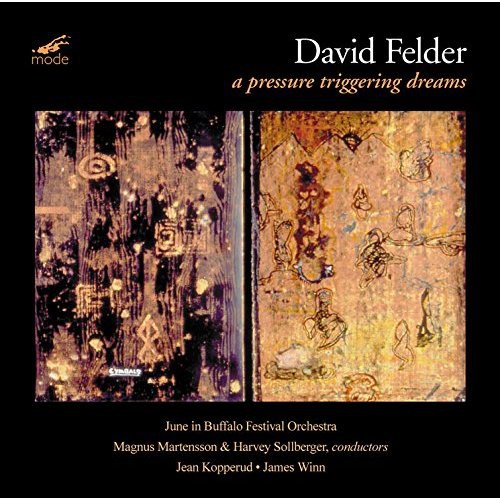- A Pressure Triggering Dreams
: Review
The American Composer David Felder (b.1953) is, sadly, neither well known nor widely performed in Europe, despite the fact that some of his earlier chamber works have been presented at many of the top festivals for contemporary music, be it the Holland Festival, Huddersfield, Wien Modern or Darmstadt.
In recent years, his writing turned more and more towards big, uncompromising and extremely difficult orchestra pieces with the result that those works are hardly ever played even in the States. Orchestras want to have an easy life and rehearsal time for demanding contemporary works is generally counted in minutes rather than hours. Recently, Felder commented: "My music is very difficult and as I like to say, it is not coming to your town soon." But his time will come and if it is only because great music has always come to light and can not be suppressed. By now, orchestras have learned, how to play Mahler, Ives and, more or less against their will, even Birtwistle. If the big ones want to survive, they will have to learn, how to cope with music that does not crawl on all fours before an orchestra or an audience.
David Felder, who in his youth belonged to the tenor voices of the Cleveland Symphony Choir (Music Director Pierre Boulez), sitting right behind the middle of the brass section, and who, simultaneously, ran his own radio station and earned a Ph.D. from the University of California, San Diego, in 1983. His interest in electronics led to his being labelled an electronic composer, which is utter nonsense. For many years, Felder has taught composition at the State University of New York at Buffalo, where he also holds the Birge-Carry Chair in Composition. Since 1985 he leads and directs the Festival "June in Buffalo", a weeklong seminar for emerging young composers; from 1992 to 1996 he had been composer-in-residence to the Buffalo Philharmonic Orchestra, while in 1996 he formed the Slee Sinfonietta, one of the very few chamber orchestras in the USA entirely devoted to contemporary music.
His works are published by Theodore Presser; his first CD containing various chamber music had been released on the Bridge Label in 1996, and was named "disc of the year" in chamber music by the American Record Guide. His second CD, released this June on the mode label, confronts the listener with two of Felder's most complex and outstanding works for orchestra, Six Poems from Neruda's Alturas.(1992-93) and a pressure triggering dreams (1996-97) as well as the chamber version of Coleccion Nocturna (1982-83) for clarinet, bass-clarinet, piano and 4-channel tape.
Having listened to those three works over and over I am always astonished that, despite the wide-ranging changes in dynamics and colours, any so called 'contemporary' smack is missing entirely. It is music for the 21st century, true to itself, extremely powerful, honest and full of discovery.
"Coleccion Nocturna", the title of a poem by the Chilean poet Pablo Neruda, whose thinking had a profound influence on Felder, consists of five variations, based on a theme from an earlier work. They mirror a kind of electrifying tension as well as a crystallization of emotions, 19 minutes of foremost constantly changing musical perspectives, which despite the technical demands speak with an extraordinary directness. Six Poems from Neruda's 'Alturas... had been commissioned by the NewYork State Council on the Arts and the Buffalo Philharmonic Orchestra. In 1994, the work had its European premiere during the Festival of the International Society of Contemporary Music in Stockholm. For this recording as well as for the recording of a pressure triggering dreams David Felder was able to use the June in Buffalo Orchestra, dedicated and committed virtuoso players fromall over the States and Canada, assembled each year for the Festival June in Buffalo.
The result is just breathtaking. Neruda may have triggered the first and decisive impulse, but it is the music, which captivates instantly. Suddenly, the complex compositional structure becomes irrelevant; there is ingenious music in its purest sense, which with its sheer power, aesthetics and depth doesnot ask any theoretical questions, but wants to be listened to many times. The overflowing evocative tension, the sensual atmosphere, the sometimes depressive, but soon again playful gestures as well as the sublime irony in all three movements breathe an incredible tenseness. Felder combines his deep knowledge of the past and the present with a constant searching on a philosophical, human and musical level - a Gustav Mahler for the 21st century. Those 25 minutes confront us with all the inner dimensions of the human existence. Despite its performing difficulties - originally even Mahler had been rejected as unplayable by certain orchestras - this work earns a constant place in the repertoire of any great orchestra.
a pressure triggering dreams, commissioned by the American Composers Orchestra with there quest to incorporate electronics, had its premiere at New York's Carnegie Hall in May 1997. The full orchestra sound is complemented by a companion 'orchestra' consisting entirely of computer-processed flute sounds, by live sampler keyboards, electric bass and by selectively amplified solo instruments. For Felder, some quotes from Nietzsche's The Birth of Tragedy serve as a kind ofmental godfather. But any literal impulse as well as any compositional detail are secondary compared to the overwhelming unfolding of the musical impact - 20 minutes of fulfilled music, which absorbed the past and creates on the basis of an universal view of life new and fascinating energies.
This technically impeccable recording, conducted by Magnus Mårtensson and Harvey Sollberger under the supervision of the composer, should ease the way for David Felder to be heard live on Europeanconcert platforms.
